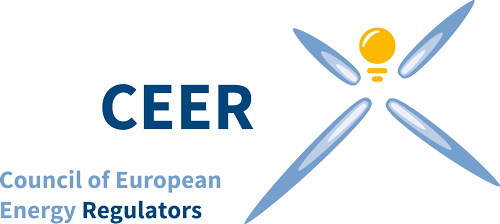Blog: Women in Energy
Stories of Women Leaders in Energy: Ms Jana Haasová
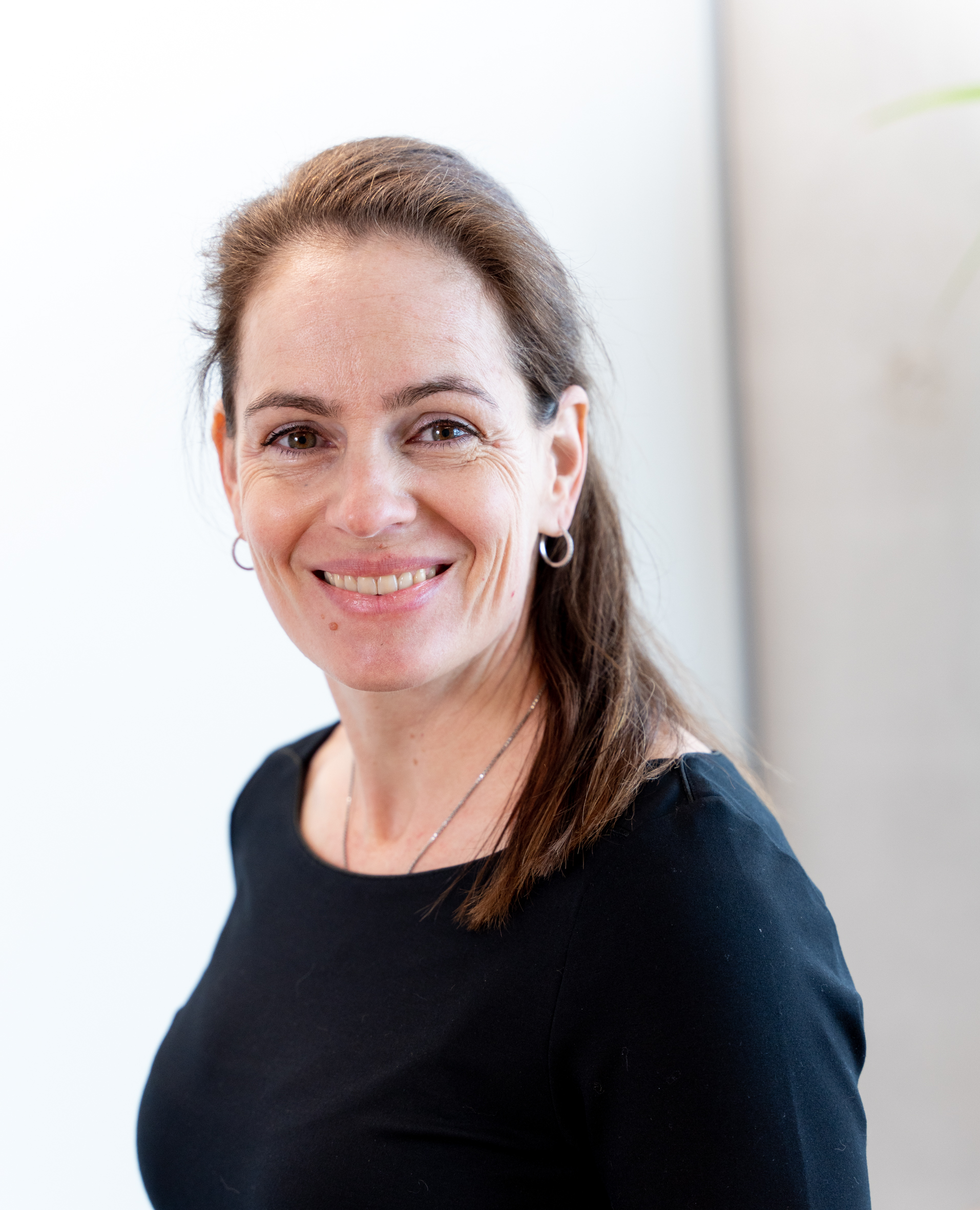 In an industry historically dominated by men, women have slowly and steadily made their mark in the energy sector, challenging norms and driving innovation forward. Ms Jana Haasová's remarkable journey serves as an inspiration for young women seeking to advance their careers in the energy sector. Her passion for work, commitment to innovation, and belief in the power of diversity have enriched her career and propelled her to leadership positions.
In an industry historically dominated by men, women have slowly and steadily made their mark in the energy sector, challenging norms and driving innovation forward. Ms Jana Haasová's remarkable journey serves as an inspiration for young women seeking to advance their careers in the energy sector. Her passion for work, commitment to innovation, and belief in the power of diversity have enriched her career and propelled her to leadership positions.
Ms Haasová's adventure in the energy sector began over a decade ago. Currently, Ms Jana Haasová is responsible for overseeing the International Relations Department of the Energy Regulatory Office (ERO) of the Czech Republic. At the same time, she has held the position of CEER Vice President since November 2022.
When asked about her message for young women choosing their profession, Jana described the energy sector as an exciting space with a mixture of law, economics, and technical tasks. Her recommendations include embracing challenges as growth opportunities, stepping out of one's comfort zone, seeking mentors and role models for guidance, and acknowledging that workplace diversity fosters innovation and success.
For Jana, her most significant personal achievement lies in her family - her husband and two children. However, she is equally passionate about her professional accomplishments. Serving as CEER Vice President and leading her team at ERO has been a source of immense pride for Jana, as her expertise and dedication have contributed to advancing regulatory practices in the energy sector. Alongside her professional achievements, Jana is also passionate about sports, boasting notable achievements in running marathons, biking, alpine and cross-country skiing.
Reflecting on her journey, we asked Ms Haasová if she would change anything if given the opportunity to travel back in time. She firmly believes that failure and setbacks are valuable learning experiences that provide opportunities for growth and development. Rooted in this mindset, she encourages to view obstacles as stepping stones towards personal and professional growth.
Jana draws her inspiration from individuals who not only talk about making a difference but also take significant and positive actions. Surrounding herself with like-minded persons who believe in the power of action has shaped Jana's approach to her work and influenced her professional growth.
To foster greater engagement of women in the energy sector, Ms Haasová believes that creating supportive work environments with policies promoting work-life balance and inclusivity is crucial. Additionally, showcasing successful women already excelling in their careers as role models can help challenge stereotypes and encourage more women in the energy sector. By destigmatising women's presence in the sector and highlighting their achievements, the industry can continue its journey toward true gender equality.
Stories of Women Leaders in Energy: Mária Bronišová
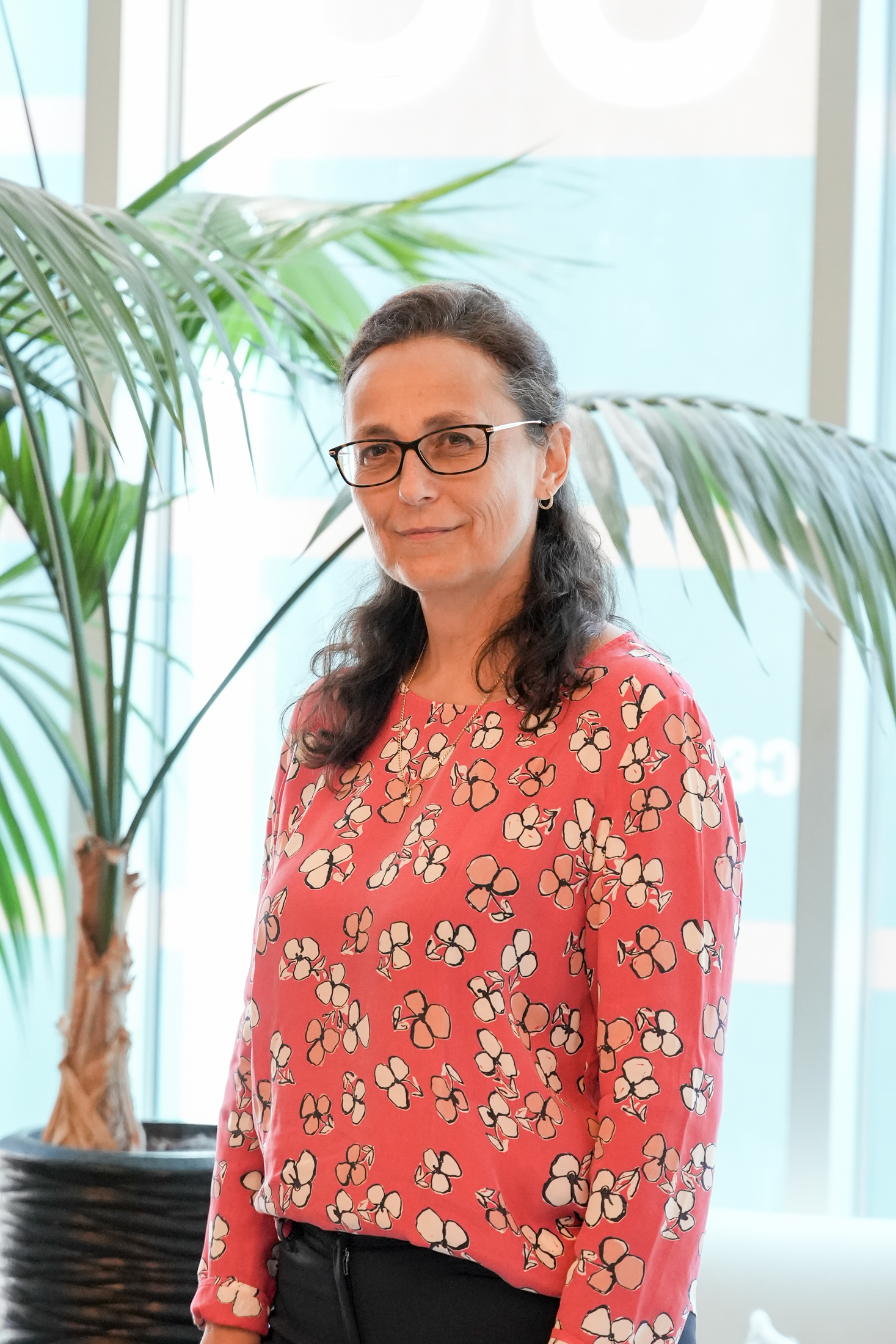
In 1993, Ms Mária Bronišová embarked on her professional journey in the energy sector, initially working with French engineers at a nuclear power plant shortly after graduating from the University of Bratislava.
After two years, she transitioned to the gas sector, collaborating with French experts. Her focus involved conducting in-depth technical and financial studies in areas such as energy management, gas transmission, and underground gas storage systems.
Over approximately two decades, Ms Bronišová held various positions within the gas sector, including asset management, product trading, regulation, and energy efficiency, collectively contributing to her wealth of experience in the industry.
About four years ago, she decided to apply her knowledge and expertise to the Regulatory Office of Slovakia, where she became the Head of the International Relations and Market Monitoring department. Her work encompasses energy market integration, electrification, deployment of innovative solutions, and diversification of energy sources. She’s passionate about promoting innovation in the energy system, creating new products and opportunities for trade in the gas sector, and advocating for transparent and respectful management practices.
As a mother of two, Ms Bronišová strives to be a role model, guiding her children towards becoming well-rounded individuals with strong values and helping them grow personally and professionally.
Ms Bronišová believes that ethics, integrity, trust and independence are a set of moral principles and values that govern one's behaviour and decision-making. Ethics means doing the right thing, even when no one is watching, and acting with honesty and fairness. Integrity is essential in guiding her actions, especially in situations where explicit rules may be lacking or conflicts arise. This moral compass helps her make correct and ethical choices.
Trust is also a crucial element for Ms Bronišová. It is the belief in the reliability, honesty, and competence of others. She firmly believes that without trust, achieving integrity becomes a huge challenge, as trust serves as the cornerstone of any productive relationship or endeavour. This bedrock of trust empowers her to collaborate effectively and pursue shared goals.
Moreover, independence, in her view, doesn't entail disregarding rules or principles, but having the autonomy to make decisions free from external influence. It is about being self-reliant and having the ability to convince others that proposed solutions are logical, based on reality, and align with her strong positions.
Overall, these values and principles guide Ms Bronišová in her pursuit of success and reaching her goals. She believes that purpose, discipline, and organisation in both personal and professional domains can foster conditions for achievement. Working with intelligent and diverse individuals has motivated and inspired her to constantly seek new perspectives and embrace new challenges.
Ms Bronišová's key message to women starting their careers in the energy sector is that it offers a wealth of opportunities for growth and the discovery of areas that genuinely pique one's interest. Both men and women can succeed and progress in their careers with the right professional skills. She emphasises the importance of continuous learning, developing new skills, and maintaining integrity, respect, and confidence. With strong motivation and interest in achieving goals, anything is possible.
Ms Bronišová encourages women to believe in their ability to achieve objectives, especially with a clear goal and self-confidence.
Stories of Women Leaders in Energy: Ms Liana Azizyan
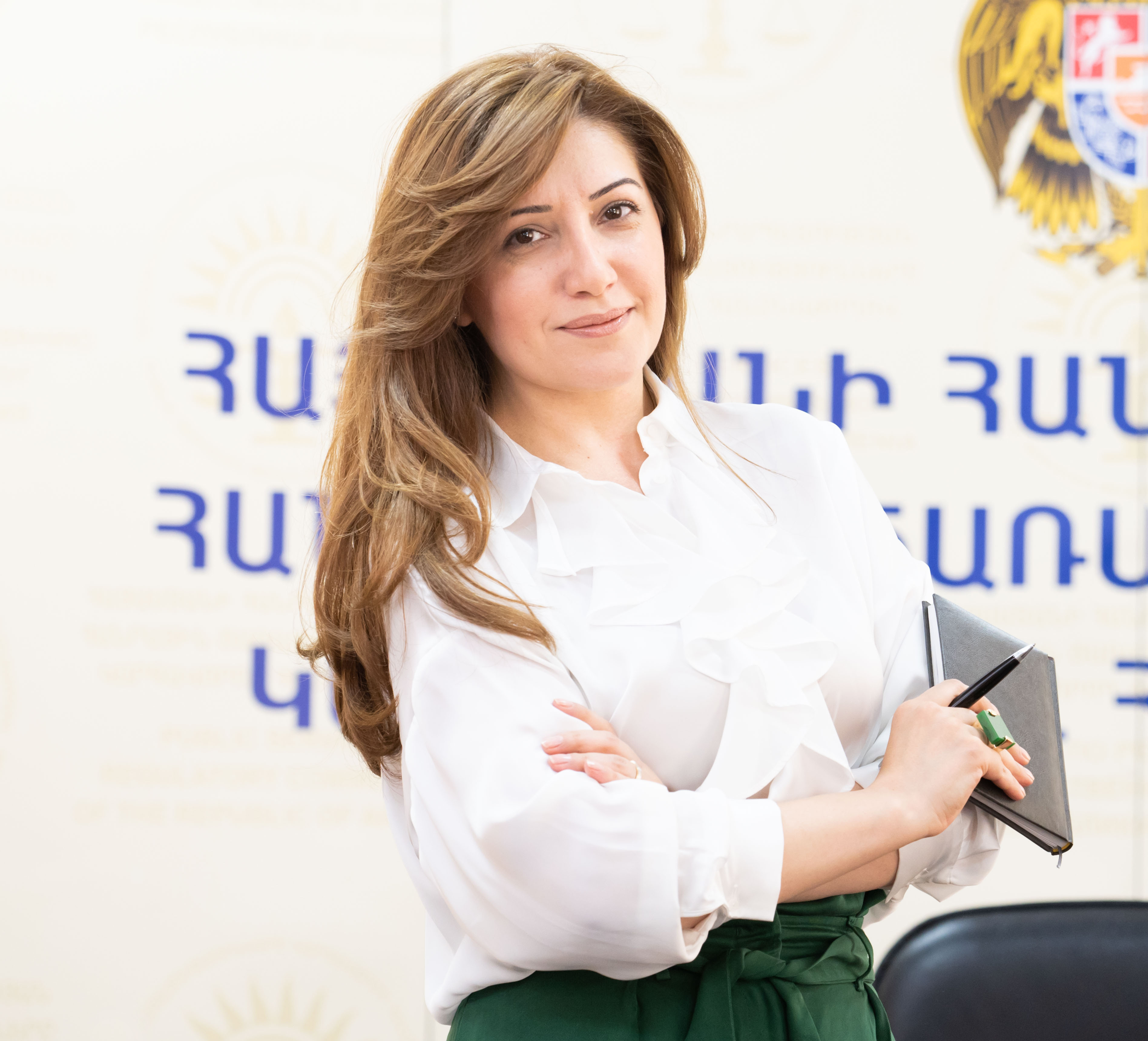 With 13 years of dedicated experience at the PSRC, Liana Azizyan has become a highly knowledgeable and skilled professional in energy regulation. Her unwavering commitment to personal and professional growth has made her an invaluable asset to the Regulatory Commission.
With 13 years of dedicated experience at the PSRC, Liana Azizyan has become a highly knowledgeable and skilled professional in energy regulation. Her unwavering commitment to personal and professional growth has made her an invaluable asset to the Regulatory Commission.
Liana’s journey began in the field of journalism, providing her with a solid foundation for learning and professional growth. This experience deepened her understanding of the media industry. Later, she served as a university lecturer, allowing her not only to share her knowledge with the younger generation but also to foster her own professional development.
At the PSRC, she started in the Legal Department as an editor-in-chief. This role provided her with extensive insights into energy sector regulation and the importance of the Commission's work in ensuring fair and efficient services.
“My true passion has always been related to journalism, particularly in public relations (PR). I would like to quote Ronn Torossian, who describes PR as a blend of journalism, psychology, and lawyering. It is a dynamic and constantly developing field that I find fascinating.” – says Liana in her interview.
“Throughout my career, I have learned the importance of taking risks for growth. When I was given the opportunity to join the PSRC, I realised that I was changing my career trajectory by believing in myself and my potential. I am excited for the future and eager to advance further.”
Outside of her professional life, Liana is a dedicated mother. With her family’s support, she manages to balance her professional and personal commitments. “The energy I get from my family and friends fuels my motivation to excel in my profession. My inspiration comes from the people around me. I have learned a lot from my colleagues at the PSRC and their passion continues to inspire me.”
Liana values independence as a mindset and a feeling of stability and harmony. She places a strong emphasis on integrity, which she defines as the quality of being honest and truthful. Building trust through reliable relationships is paramount to her, and ethics serve as guiding principles that shape her decisions in both her personal and professional life.
Stories of Women Leaders in Energy: Ms Irina Țerigradean
Irina Ţerigradean holds the position of Deputy Head of Policy Implementation and Monitoring Department at the Energy Efficiency Agency of the Republic of Moldova, where she is responsible for ensuring the process of elaboration and substantiation of policy documents in the field of energy efficiency and renewable energy sources, as well as the process of monitoring their implementation, including the collection of necessary information.
A licensed engineer and mother of two, Ms Ţerigradean still finds time for professional development and education. She is doing her MA studies in Public Administration and believes that her children benefit from having a happy, fulfilled mother, who can act as a role model for them. “I am grateful for everything I have. I know I still have to work and improve myself, therefore I persevere. Every day we must strive to be better than the day before, to be a better version of ourselves.”
Irina advocates for professional equality, calling on young women to put their fears aside and to “have the necessary courage and confidence that they will succeed in their endeavours. There are no fields in which a woman cannot be successful. If you put in the effort, the results won't be long in coming. The energy domain is as complex as it is interesting. As someone working in the energy field, and even as a student in the energy faculty, it becomes clear that this field is not for the faint of heart. It takes knowledge, will and perseverance, an active spirit, but also helps you to come up with intelligent solutions.”
Irina is one of those fortunate enough to take pleasure in their work. “Professionally, the biggest achievement is that my work brings me pleasure. I feel important, and I know that I have a special role in the evolution of the energy sector in my country. The Republic of Moldova is 75% dependent on imported energy sources, and the Energy Efficiency Agency has an important role to play in implementing state policy in the fields of energy efficiency and renewable energy sources. All those who are employed in our country’s energy sector influence in some way or another the progress and development of our country, but also the provision of national energy security.” She finds inspiration in her colleagues working in the field, whose continuous work and efforts contribute to the development of the energy sector of the Republic of Moldova.
When asked what she would say to young woman Irina Ţerigradean at the outset of her career, Irina answers “Good luck my dear, believe in yourself, work hard and you will succeed! And may your achievements make you happy!”
Stories of Women Leaders in Energy: Rana Humbatova
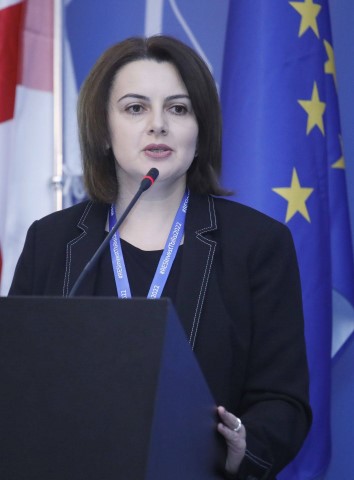
Ms Rana Humbatova holds the position as Head of the Hydrogen and Green Technology Department at Azerbaijan Renewable Energy Agency (AREA) under the Ministry of Energy. She personally and professionally advocates for the use of energy from renewable sources (RES) and is involved in the development of a regulatory framework to ensure the sustainable use of RES, as well as a decarbonisation strategy for the energy sector. Rana, throughout her 24-year professional journey, has always cared about climate change and has always supported the generation of energy from renewable energies. She is especially hopeful about hydrogen - “I believe that hydrogen will play an important role in decarbonisation and the energy transition around the world. It is vitally important to ensure the use of “green” technologies and hydrogen for the decarbonisation of the energy sector.”
Rana thinks that doing the things one loves and is interested in, as well as believing what she/he does, leads to success. “Start asking yourself what you really want. Try to imagine the ideal professional position for yourself and make it your goal to arrive at that dream destination of yours. It’s easier to navigate throughout life when you know exactly the desires of your heart. In my view, to create a future where everyone has access to affordable, zero-carbon energy, we need young professionals. According to the IRENA’s “Global Renewables Outlook: Energy transformation 2050”, the development of the local renewable energy industry has the potential to create jobs that can be filled by people of all genders and from all disciplines and backgrounds. However, I believe substantial improvements should be made initially to our education system to integrate science and engineering into one curriculum. This is crucial for the development of renewable energy not only in Azerbaijan but throughout the world. At AREA, we participate in capacity-building activities by working closely with student chapters from various universities and higher education institutions. We conduct introductory lectures and see the growing interest of young professionals, both men and women.”
In response to the question about her biggest personal and professional achievement and inspiration, Rana stresses the importance of teamwork and support coming from family and close surroundings – “Over the 24 years of my professional experience, I have learned one main thing - only teamwork can lead to real success, I want to thank all the colleagues who have worked with me all these years. The ability to manage even in the most stressful situation, is what I consider my main achievement. I find my personal and professional inspiration in my family and my friends, who have always supported me even in the most difficult periods of my life and career. And, of course, success stories of women worldwide. Never give up and always achieve the goal set, even if it seems unattainable, always follow new trends and try to keep up, and never rely only on the experience gained over the years, the most important is lifelong learning.”
When asked what she would have changed in the past if she had had a chance, Rana refuses to change anything – “I would not like to change or correct anything. I believe that everything that happens to us in the past leads us to new achievements, overcoming difficulties on our way is an experience that only makes us stronger and prepares the ground for success in the future.”
Strive to Become an Expert, Make Your Path a Pleasant Journey Rather Than an Exhaustive Race

Ms. Valeria Korcheva, the second-place winner,
Autumn Digital EU4Energy Week for EaP Universities
Ms. Valeria Korcheva, Master student in international law of the National University “Odessa Law Academy”, came second in the competition organized in the framework of the Autumn Digital EU4Energy Week for EaP Universities. Valeria has a strong and growing interest in the field of energy since the energy sector combines different aspects of economy, ecology and politics. She aspires to become the person who always strives to find the solution to a problem and already now, at the outset of her professional life, thinks about how to balance the growing demand on energy with raising environmental concerns – “We have to integrate energy generation into natural processes in a way to utilize nature’s potential and at the same time avoid its destruction. We have to go with nature, not against it and try to resolve the problem human beings have created”.
Valeria took the opportunity and decided to attend the Autumn Digital EU4Energy Week for EaP Universities when her professor suggested participating after the request was sent to EaP universities to nominate students with background and interest in energy. “The interesting agenda coupled with the award – a training course in Brussels on energy immediately caught my attention. The EU4Energy Week for EaP universities helped me to consolidate my interest towards this field and acquire new knowledge from high-level experts [from the Council of European Energy Regulators (CEER), the International Energy Agency (IEA) and the Energy Community (EnC)].
“Having no background, but only pure interest towards the field of energy, I challenged myself and almost a month later I am sitting here giving my very first interview. With that being said, I hope that people will see my case as proof that when you follow your interests, make an effort and invest in what you like – it will definitely pay off. Do not consider yourself to become an expert in a moment – that’s a journey worth walking rather than a race full of stress and exhaustion. Enjoy it!”
Being at the outset of her career, Valeria finds the responsibility for other people and their trust to be an important aspect of her improvement. “I am willing to provide guidance if I know that’s within my competence to help. I have never considered leadership a good thing for showing how meaningful and powerful someone is – it is more about caring for people you are willing to take responsibility for, as you trust them, and they trust you”.
In response to girls and women empowerment and how to handle underrepresentation of women in science-technology-engineering-and-mathematics (STEM) fields, Valeria thinks that today there are more and more opportunities for everyone to find their place in life, so the perspectives are brighter for women.
Furthermore, boys/men have been from a very early age brought up to be the breadwinners and main financial contributors in the family. “Mothers used to have higher expectations with regards to their sons that they have a prestigious high-paid job, and so did fathers. Technical jobs are known to be in preference worldwide, and as men are traditionally expected to protect the family and be the main financial supporters, they are more likely to be motivated and encouraged to apply for jobs in the STEM field. Still, today women can share these responsibilities with them. I think that’s what helps both in securing a stronger support within families and finding one’s happiness in the professional way he/she chooses.”
Both big and small efforts, like the one made by the EU4Energy Programme, increase the visibility and motivation of girls/women to engage in the STEM fields. “My advice to those girls who are choosing their field of study or making their first steps in their profession would be: always try to become an expert and maintain a positive mindset.”
Recognising, Promoting and Celebrating the Success of Women
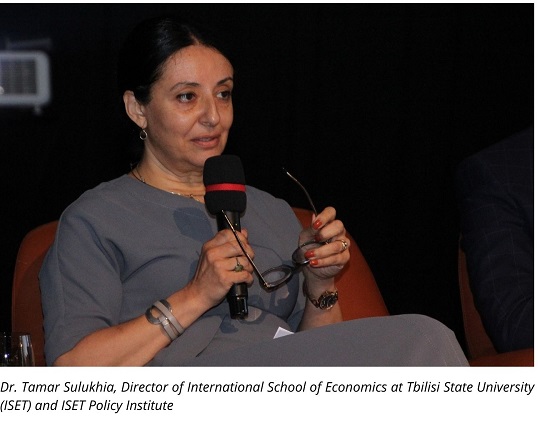 “We have to recognize, promote and celebrate high achievements of women, as it is very encouraging for a new generation to see that many women, despite going through a very difficult path, have fulfilled their goals and ambitions. Those women managed to strike a balance between their roles and responsibilities in the family and professional advancement. The beauty of success is when you manage to level off all aspects of life - being family, friends, social responsibilities, and professional opportunities,” says Dr. Tamar Sulukhia, Director of International School of Economics at Tbilisi State University (ISET) and ISET Policy Institute.
“We have to recognize, promote and celebrate high achievements of women, as it is very encouraging for a new generation to see that many women, despite going through a very difficult path, have fulfilled their goals and ambitions. Those women managed to strike a balance between their roles and responsibilities in the family and professional advancement. The beauty of success is when you manage to level off all aspects of life - being family, friends, social responsibilities, and professional opportunities,” says Dr. Tamar Sulukhia, Director of International School of Economics at Tbilisi State University (ISET) and ISET Policy Institute.
ISET Policy Institute has developed a Gender Equality Index1 for the twelve Post Soviet Union countries (with the exception of Uzbekistan, Tajikistan and Turkmenistan) using data from the World Bank, United Nations (UN), International Labour Organization (ILO), World Health Organization (WHO) and individual countries and applying the methodology of the European Institute for Gender Equality. The index is looking at gender equality in six key domains: power, work, money, knowledge, time and health. The work domain measures the extent to which women can benefit from equal access to employment and good working conditions, the power domain studies gender equalities in decision making positions across political, economic and social spheres and the money domain measures gender equality in terms of access to financial resources.
The research shows an imbalance between the share of men and women in the share of Science, Technology, Engineering and Mathematics (STEM) professions, depriving science and technology of a greater opportunity for innovation, as increased women’s engagement often promotes greater innovation and greater creativity. Furthermore, there is evidence that when teams are gender balanced, those teams are more creative and achieve higher/better results or achieve those results in a more efficient and timely manner. Energy sector utilities having at least 30% of women in the boards have higher profit margins. These results clearly demonstrate why gender equality should concern everyone; not only women or human rights advocates. Companies with strong female leadership deliver higher return on equity; companies with female executive board members outperform those with male-only boards.
However, there are many obstacles and challenges that have an influence on women’s representation in the STEM field. Examples include the pay-gap between women and men, which lowers women’s ambition and motivation to excel in the profession, as well as the imbalance between genders in the process of recruitment. The statistics show that in many fields, including energy and other infrastructure sectors, there is a tendency and even preference to recruit male professionals rather than women. This deprives women of the opportunity to advance in their careers and improve their quality of life, but also deprives companies of the benefits of a gender-balanced team.
In the energy sector women only account for 22% of workforce, while 48% of global workforce are women. Only 6% of women are executive board members and less than 1% of women are CEOs in the oil and gas industries.
In response to the question how universities can help to improve gender underrepresentation in STEM related professions, Dr. Sulukhia noted that according to UNESCO data, 35% of students are women in STEM professions and only 30% of the world’s researchers are women. Consequently, gender inequality starts from university and is later translated into fewer women in STEM professions. However, a lot of initiatives have been directed to promote female participation and involvement in STEM sectors starting from school and universities. To make the transition from university to professional life, university professors and deans could offer mentorship and guidance to female students, as well as ensure recommendations for internships and provider more scholarships to female students, etc. A huge accomplishment would be to introduce quotas for women representation in boards and committees which is a verified standard. Moreover, other measures like making job advertisement more female friendly, saying women are encouraged to apply or including female members in job selection committees/boards might also have a positive effect.
Dr. Sulukhia says that the attraction and recruitment of women to the energy sector could be done through changing social norms, encouraging role-models, whereas for the retention of women in the sector it is very important to create female friendly, harassment free environment/facilities, equal pay policy and to retain healthy work-life balance.
EU4Energy promotes gender equality and encourages greater participation and visibility of women in the energy sector through a series of interviews on its Blog: Women in Energy. The aim of the Blog is to promote professions in the energy/power sector towards women and raise awareness about the women who contribute to its development, as well as about promising women who are taking their first steps in the profession. The Blog aims to encourage the young female generation to choose a profession in the energy/power sector and discover the advantages and adventures associated with it.
